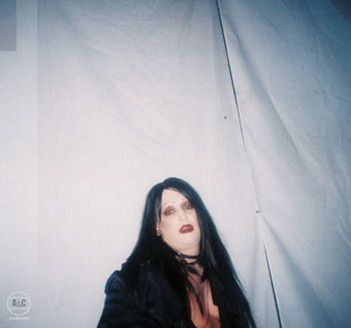Oh look, another quasi-mysterious “darkwave” duo. This one’s called Trust, and its members — Robert Alfons and Maya Postepski — hail from Toronto. On first glance, their debut album TRST seems to tell you everything you already knew: artful misspelling of the title, vintage photograph of a vaguely goth girl, a mysterious lack of text or other identifying information. This is going to be a synth-pop album that finds itself somewhere between Salem’s distorted witchery, John Maus’ Reagan-era electronics, and the Pet Shop Boys’ cynical (yet endlessly danceable) new wave, isn’t it?
Yup. There are no genre surprises to be found on TRST — it sounds exactly like you think it will. Oh, there’s just one thing: it’s also fantastic.
If there were such a thing as aural cocaine, these eleven songs would be cut so purely that you’d think they were for Tony Montana himself. Addictively catchy, these songs — “Bulbform,” “Gloryhole,” “Heaven,” and “Candy Walls” especially, the latter having originally seen release last year as a single along with the wonderful (and sadly absent) “Trinity” — are rife with hooks yet never seem forced. Of course, it doesn’t hurt that the record simply sounds terrific. Vocal duties for the most part unexpectedly fall to Alfons, whose imperfect delivery casts a sinister yet not overbearing pall over the happily non-lo-fi proceedings. Synth lines ring out with reverberating clarity like church bells at a rave; beats remain steady, chugging, clamorous things.
But it’s the songwriting that elevates TRST over its many eyeliner-smeared counterparts. Even after several listens in the span of a few days, the chorus of “Gloryhole” still gives me goosebumps. “Candy Walls,” meanwhile, settles like a nighttime fog, its ethereal tones gently scraping their tendrils against an unhurried midtempo rhythm and Alfons’s nasally singing. And “Bulbform” sounds like a children’s lullaby given a shot of adrenaline and corrupted into something more mature and beautiful.
Following “Gloryhole,” Postepski takes over the vocal work; at this point, TRST loses a bit of momentum, though the second half could equally be viewed as a necessary comedown. “This Ready Flesh” finds her speak-singing about “a new sensation” over a driving beat that recalls Terminal Twilight’s House of Love. “F.T.F,” on the other hand, features her singing voice proper, which shares an endearingly untrained quality with that of Modern Witch, say, or Sierra from Joy and Revolution. Two-thirds of the way in, Alfons returns, his rickety timbre providing a nice counterpart to Postepski’s more delicate crooning. All the while, an Atari dons black lipstick and dances in front of a mirror; such is the macabre simplicity of the backing synth work. There’s a homey, moonlit charm to this album, a bedroom-carpet-as-dance-floor shamelessness that offers a refreshing earnestness in the sea of triangle-and-cross-filled pretensions that comprise Trust’s particular genre peer group.
52 minutes is a pretty damn lengthy runtime for a debut synth-pop album, but TRST flies by. Its massive replay value again calls to mind the work of the Pet Shop Boys; in fact, both duos use melodic catchiness as a means of enticing the listener. Which is what catchiness is supposed to do, of course, but beyond simple hooks and bridges, both duos also share a finely-honed sense of pacing, knowing just when to turn things up or tone things down over the course of a song—and, crucially, of a full-length album. By the time Alfons busts out his falsetto (not for the first time) on “Chrissy E,” I’ve been utterly charmed.
And that perhaps is this album’s most impressive achievement: for a couple of seeming misanthropes, Trust make awfully welcoming and charismatic music. “Honestly, I can’t take it tonight,” sighs Alfons on the Sally-Shapiro-esque closer “Sulk.” “Everybody wanted me,” he continues, and if Trust keep make music this fun, I can’t see that changing anytime soon.

